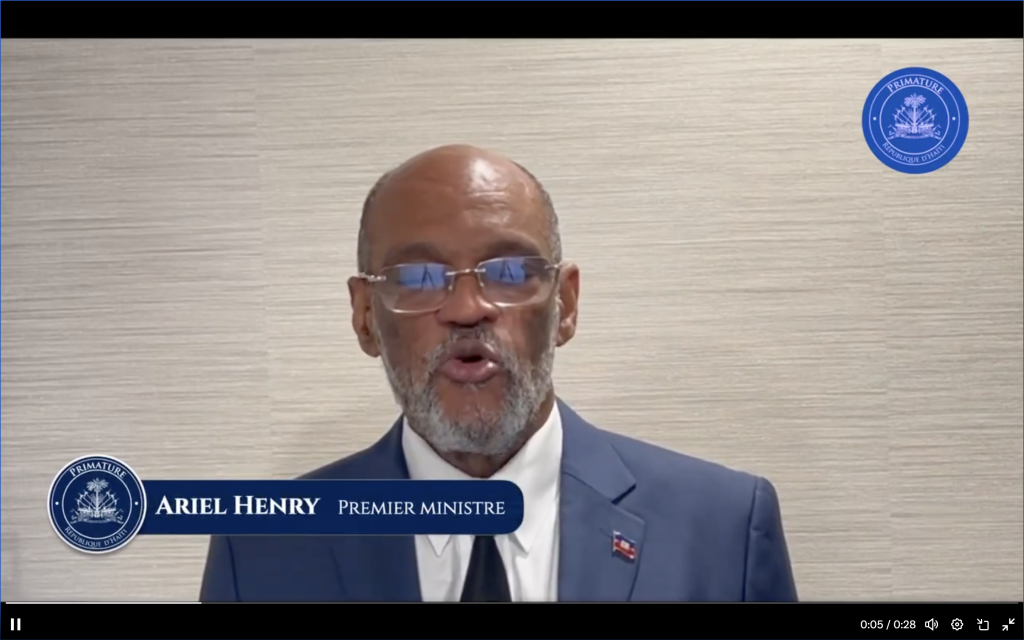
Who will name the transition presidential council members in Haiti? Criminal gangs are in control and now impede Henry from returning. Their leaders expect to be included in the new government. Former Cap Haitien strongman Guy Philippe understands he is the man. El Salvador’s Bukele says his teams can fix Haiti.
Meanwhile, Guyana President Irfaan Ali, who chaired the Monday, 11 March 2024 Caricom high-level meeting on Haiti with US Secretary of State Antony Blinken and Mexico Foreign Minister Alicia Barcena in Kingston, Jamaica, announced in a press briefing following the meeting that Prime Minister Ariel Henry has said he would step down once a transitional presidential council is created and an interim premier is named.
74-year old physician Henry has held the position unelected since the 7 July 2021 assassination of President Jovenel Moise. Moise had chosen Henry as his successor. Henry is in Puerto Rico after traveling abroad to meet with Kenya President William Ruto and not being able to re-enter due to closed airports. Criminal gangs that control Haiti demand his resignation.
“We acknowledge his resignation upon the establishment of a transitional presidential council and naming of an interim prime minister,” said Caribbean Community chair Irfaan Ali, speaking in the briefing after the 11 March 2024 Caricom consultations. Ali thanked Henry for his service to Haiti.
Ali said a seven-member presidential council will be formed for the transition to elections in Haiti, which will appoint a new interim prime minister, as reported in the Guyana Chronicle.
After the meeting with Caribbean leaders, US Secretary of State Antony Blinken announced US$100 million in funding for the deployment of a multinational force to help stop criminal gang control in Haiti and an additional US$33 in humanitarian aid.
After hours of intense meetings and discussions, chairperson Ali, said during the press briefing on the conclusions, that Caricom’s ‘singular and primary concern’ remains the citizens of Haiti. “We have held deep and honest discussions with our Haitian brothers and sisters who represent the political and civil society and faith-based leaders of the Haitian people, to attempt to arrive at the consensus around an effective, inclusive, transitional government structure to take the country to general elections in the shortest possible time,” he said.
Jamaica’s Prime Minister Andrew Holness said at the press briefing that Haiti needs new cohesive domestic resolve and the support of its partners, as reported on the Guyana Chronicle. “The people of Haiti deserve the opportunity to experience another way of being, to determine their destiny, to secure their rights and to be free from oppressive forces within and without,” said Holness.
Noting that Haiti is now at its “tipping point,” Holness stressed that the multinational security support is a necessary and critical first step to restore basic law and order to the country, to allow for stability and the distribution of much-needed humanitarian assistance to citizens who have been severely affected by the distress at the hands of criminal gangs.
Speaking at the briefing, US Secretary of State Blinken said: “Only the Haitian people should determine their own future, not anyone else but all of us Caricom, the United States, our other partners we can help…we can help restore foundation and security; we can address the tremendous suffering that innocent Haitians are experiencing.”
The Ministry of Foreign Relations of the Dominican Republic set the country’s position in a statement. The Dominican Republic is not a member of Caricom.
Haiti’s de facto rulers, the criminal gangs, have intensified their efforts to expedite the process of appointing a new presidential council to govern the nation. The question is who will be on the transitional council when the UN mission is precisely to control these gangs.
At the present time, Haiti’s Ariel Henry is impeded to return by the gangs that control the country. The Dominican Republic also refused to accept his using the DR as a transit point back to Haiti given national security issues. The land borders are still open but with major restrictions.
President Luis Abinader had confirmed that on 4 and 5 the governments of Haiti and the United States had asked if the Prime Minister could make an indefinite stop in the Dominican Republic. This was not approved and Henry landed in Puerto Rico from New Jersey. Abinader said Henry’s entry was not considered prudent to safeguard national security.
Read more:
DR1 News
Guyana Chronicle
Ministry of Foreign Relations DR
DW
Hoy
12 March 2024

